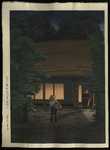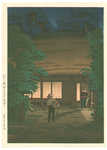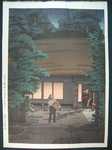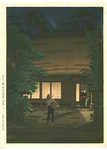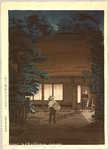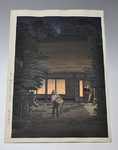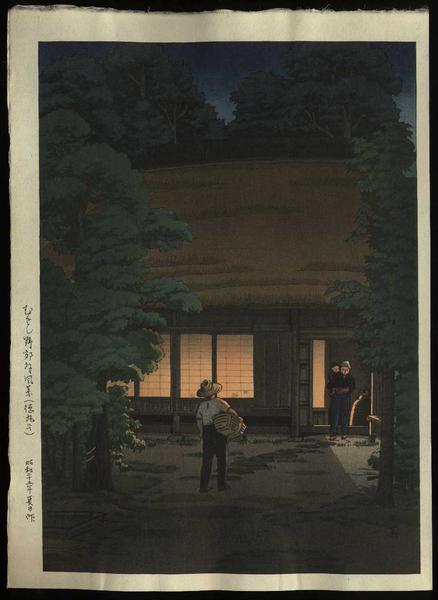| | |
| Artist: | Ishiwata Koitsu (1897-1987) Yoshimi — 石渡江逸 芳美 |
| Title: | Musashino Kougai Fukei Tokumarunite — むさし野郊外風景 |
| Series: | |
| Date of first edition?: | 1950 |
| Publisher (first edition)?: | Shobisha |
| Publisher (this edition)?: | Shobisha |
| Medium (first edition): | Woodblock |
| Medium (this edition): | Woodblock |
| Format (first edition): | Oban
|
| Format (this edition): | Oban |
| DB artwork code: | 34478 |
| Notes (first edition)?: |
Signed Yoshimi at the lower right.
Published by Shobisha, not Watanabe, otherwise Koitsu would have used his Koitsu psydonym rather than Yoshimi. Some prints have the red round Shobisha publisher seal on the verso. |
|
| Notes (this edition)?: |
| The following information was taken from the original web listing of this artwork. Note that there may be some inaccuracies:
Musashino Kougai Fukei Tokumarunite by Ishiwata Koitsu. Genuine woodblock print dated Showa 25 (1950). Later impression from original blocks. Fine condition, color and impression. 16.3 x 11.8 inches. Title and date in left margin. Strong ink bleedthrough.
|
|
| Artist Bio: |
Ishiwata Koitsu, the lesser known of the two print designers named 'Koitsu', is notable for his realistic portrayals of Japanese village life. Ishiwata was born in Shiba, Tokyo with the given name Ishiwata Shoichiro. He was no relation to the older Tsuchiya Koitsu who also worked as a woodblock artist in the 1930's. In his youth, Ishiwata studied textile design and Nihonga style painting with his brother-in-law, Igusa Senshin. His meeting with Hasui in 1917 stimulated his interest in designing woodblock prints. Following the catastrophic 1923 earthquake, Ishiwata began his artistic career as a textile designer for the department store Nozawaya, located in the smaller city of Yokohama. The area around Yokohama would later become the subject of many of his landscape prints.
Around 1930, Ishiwata left his successful design position to join the publishing studio of Watanabe Shozaburo. He studied print design with Kawase Hasui and, in 1931, Watanabe published Ishiwata's first series on village life. Ishiwata's prints focused on ordinary activities like buying groceries or getting a haircut. He did not omit unpleasant details like dilapidated buildings or electrical poles. In 1935, Ishiwata left Watanabe's studio to work with the publisher Kato Junji. He designed a series on Japanese toys (Omocha e shu) that year and a series on hot springs resorts (Onsen fukei) in 1940. In later works for Kato, he combined the use of woodblock and stencil techniques. -- Hanga Gallery.
Ishiwata Koitsu used his "Yoshimi" pseudonym on prints published via Shobisha in the 1950s. You can sometimes find the red round Shobisha seal on the verso of oban-sized prints. It is probable, but not confirmed, that his many postcard-sized prints signed Yoshimi were published via Shobisha.
石渡 江逸(いしわた こういつ、明治30年(1897年 )- 昭和62年(1987年))は、大正時代から昭和時代にかけての版画家。 川瀬巴水の門人。本名は小倉庄一郎。江逸、庄一郎、芳美(よしみ)、東江と号す。明治30年、芝区神明町(現・東京都港区浜松町)に生まれた。まず浮世絵師の歌川国芳門下であった義兄、井草仙真に師事して、日本画、図案を学んでいる。その後、大正6年(1917年)、川瀬巴水に就いて日本画を学ぶが、巴水の縁により、版元の渡辺庄三郎と知り合い、木版画による風景画を制作し始めた。江逸は、東京の各地を自ら歩き回ってスケッチを行い、それらを元に、何れも名所とは程遠い、極めて日常的な光景を版画化していった。江逸は、1930年代に入ると、庄一郎と号して、加藤潤二の加藤版画店からも木版画を発表した。昭和6年(1931年)に制作された「鶴見の観音」は神奈川県横浜市鶴見区にある平安時代創建の子生山東福寺を描いたものである。翌昭和7年(1932年)制作の「夜の浅草」は、浅草六区にあった映画館「東京館」とそのきらびやかな光が瓢箪池に映る情景を鮮やかに描いており、多くの人々が洋画の上演を楽しみに行列する姿を捉えている。摺りによって光と影の表現を巧みに現し、昭和期のモダンな浅草の様子を如実に示している。昭和9年(1934年)から昭和11年(1936年)頃、加藤版画店から発表したものに大判の合羽摺「ひまわり」1枚、同「南京町」1枚、木版画「隅田川外」5枚、「おもちゃ絵集」24枚組がある。 |
|



